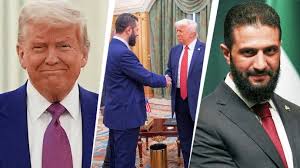In the intricate theatre of international diplomacy, few figures have attracted as much intrigue—and unease—as Ahmad al-Sharaa, Syria’s interim president and a former jihadist commander. Once a protégé of al-Qaeda and founder of Jabhat al-Nusra, al-Sharaa now stands at the helm of a nation devastated by conflict, navigating an uncharted course from militancy to statesmanship. His latest overture—an apparent bid to normalise relations with Israel—has elevated his transformation from remarkable to geopolitically seismic.
Born in Saudi Arabia in 1982 to a Syrian family displaced from the Golan Heights, Sharaa’s early trajectory was steeped in extremism. After joining al-Qaeda in Iraq in 2003, he went on to establish Jabhat al-Nusra in Syria in 2012, which later rebranded as Hay’at Tahrir al-Sham (HTS) following a formal split from al-Qaeda. Despite this distancing, his long-standing association with radical Islamist ideologies earned him widespread international sanctions and notoriety.
From Militant to President
Yet, in a turn few anticipated, Sharaa led the December 2024 campaign that ousted Bashar al-Assad, unexpectedly emerging not as a warlord, but as a sharply dressed head of state fluent in the lexicon of democracy, inclusion, and diplomacy. In recent weeks, his diplomatic circuit has included Paris, Abu Dhabi, and Manama—each visit underscored by one theme: rapprochement with Israel.
While his administration has yet to restore order, revive services, or stabilise the economy, it has invested its meagre resources in an ambitious foreign policy strategy. His meetings with U.S. President Donald Trump and French President Emmanuel Macron, alongside quiet channels opened with Tel Aviv, reveal that for Sharaa, foreign affairs are not merely a portfolio—they are the linchpin of national reconstruction.
Sharaa’s administration recognises that its domestic legitimacy remains tenuous, given the radical histories of many in its leadership. Thus, international recognition—from Washington’s overtures to France’s diplomatic engagement—serves as a crucial tool to shape internal dynamics. In other words, Sharaa is using global acceptance not just to serve domestic needs, but to redefine them.
Despite limited institutional infrastructure, financial constraints, and deep-seated sectarian and geographic rifts, Damascus is pushing forward with bold moves—engagement with Israel chief among them. It is a gamble, but one that seeks to rewrite Syria’s geopolitical script.
Israel: A Gateway to the West
In mid-April, President Trump reportedly sent Sharaa a communiqué outlining eight demands. A U.S. official in Brussels later handed Syrian Foreign Minister Assaad al-Shaibani a formal list of “confidence-building measures” in exchange for phased sanctions relief.
The demands spanned counterterrorism cooperation, resolution of chemical weapons dossiers, assistance with locating missing Americans, and operational freedom for U.S. forces within Syria. Notably absent were mentions of democracy, minority rights, or political reform—underscoring that, for Washington, two priorities reign supreme: counterterrorism and Israel’s security.
Sharaa appears to have taken note. His outreach to Israel is not a diplomatic curiosity but a calculated pivot. Reports confirm that Damascus has made secret overtures to Tel Aviv, offering to de-escalate hostilities and explore direct engagement. In return, the interim government has dangled economic enticements: energy cooperation, preferential access to Syria’s oil sector, and even the possibility of building a Trump Tower in Damascus—a move clearly designed to flatter the U.S. president.
While Israeli officials have not publicly responded, the overtures mark a dramatic reorientation. Syria, long a linchpin in the Iranian-led “axis of resistance,” may now be repositioning itself as a neutral or even Western-aligned actor. For Israel, this could signal the end of a decades-long northern threat. For al-Sharaa, normalisation offers a path to legitimacy—and survival.
Nevertheless, the move is fraught with complexity. U.S. and Israeli sceptics alike recall Sharaa’s past rejections of secular governance and his former leadership of a group that espoused explicit hostility toward Israel. For these overtures to gain traction, Damascus must back rhetoric with irreversible institutional reforms—enshrining minority protections, embracing pluralism, and rooting out extremism in law and practice.
Diplomatic Windfall
Sharaa’s bold diplomacy has begun to yield results. In a historic announcement during an economic summit in Riyadh, President Trump declared the lifting of all U.S. sanctions on Syria—marking a potential end to the country’s international isolation and opening the floodgates to regional investment.
The announcement, met with thunderous applause from Gulf elites and global dignitaries, was followed by high-level U.S.-Syrian talks in Turkey. According to insiders, Saudi Crown Prince Mohammed bin Salman played a decisive role in facilitating the deal, offering to increase Saudi investments in the U.S. from $600 billion to $1 trillion.
“This is a new chapter for peace and prosperity in the Middle East,” Trump declared. In Damascus, jubilant crowds took to the streets waving Syrian and Saudi flags, hopeful that sanctions relief would usher in economic revival.
If Syria indeed breaks from Tehran’s orbit, the regional implications could rival those of Egypt’s peace with Israel in 1979. For Israel, a weakened Iranian presence in Syria would ease strategic anxieties. For Sharaa, it could secure the legitimacy he seeks abroad and stability at home.
Yet for all the fanfare, the risks are real. “Replacing a dictator with a former extremist is hardly reassuring,” one U.S. official remarked. Israel, too, will require security guarantees and proof of ideological moderation.
Sharaa insists he no longer governs through a jihadist lens. But sincerity must be demonstrated through tangible reform, not just optics. His outreach to Israel may be strategic or sincere—but either way, it marks a turning point in Syria’s history.
For Syria’s new leadership, foreign policy is not optional—it is existential. Without international acceptance, there can be no reconstruction. Without sanctions relief, there can be no recovery. Yet diplomacy alone cannot substitute for domestic reform. If Ahmad al-Sharaa seeks to lead not just diplomatically but nationally, he must pivot from being a tactician of the moment to an architect of enduring institutions.
Whether he is remembered as a reformed visionary or an opportunist in disguise will depend not on what he promises—but on what he institutionalises.


